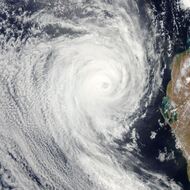Stay safe and make sure your site is prepared.
| Date: | Tuesday, 09 January 2018 |
|---|
The Department of Mines, Industry Regulation and Safety is reminding mining and petroleum operations throughout the State to ensure contingency plans are established and can be activated if needed due to the cyclone set to impact Western Australia's North West.
The Bureau of Meteorology has established a warning zone from Cape Leveque to De Grey, including Broome, as well as remaining inland parts of the far western Kimberley and far northeast Pilbara.
They have also issued a watch zone from De Grey to Dampier, including Port Hedland, Karratha and Dampier, as well as remaining inland parts of the central and eastern Pilbara, including Nullagine, Marble Bar and Telfer.
The Department of Fire and Emergency Services has up-to-date alerts for communities that may be affected.
The bureau provides regular updates and advice on tropical cyclones impacting Australia.
A safety alert developed by the department offers the following advice for workplaces in cyclone-sensitive regions.
- Employers should develop emergency procedures and plans in conjunction with advice from DFES and other regional emergency planning groups where their work sites and camps are located.
- The emergency plans should include details for making the site safe and ensuring the safety of personnel as far as is practicable. This should include the removal or restraint of loose objects and structures and evacuation of personnel. The plans must be communicated to all personnel likely to be on site during the cyclone season.
- Every accommodation unit or donga and every transportable building on work sites in cyclone sensitive regions should be adequately secured.
- During the Blue and Yellow Alert Cyclone Warning phase, a safe and orderly evacuation of non-essential personnel from the work site or camp should be considered before high intensity cyclones pass by.
- To prevent injuries during transfer, any personnel remaining on site during the cyclone should be moved to a designated appropriate shelter well in advance of the arrival of the cyclone.
- Where personnel are required to stay on site, adequate stocks of food and other essential items should be available during the period when the site may be cut off due to high winds or flooding.
- During the Red Alert Cyclone Warning phase, when all power has to be isolated or in the eventuality of damage or interruption occurring to the power supply or telephone and internet connections, an adequate means of reliable emergency backup communication should be available on site to make contact with external emergency services should help or assistance be required.
- Each site should continuously monitor cyclone warnings issued on radio, television or the Bureau of Meteorology or DFES websites. Battery-powered radios should be available in the event of power interruptions on site.
Additional information on preparing for cyclones can be found at:

